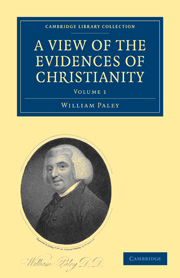Book contents
- Frontmatter
- HONOURABLE AND RIGHT REVEREN
- PREPARATORY CONSIDERATIONS
- PART I OF THE DIRECT HISTORICAL EVIDENCE OF CHRISTIANITY, AND WHEREIN IT IS DISTINGUISHED FROM THE EVIDENCE ALLEGED FOR OTHER MIRACLES
- CHAPTER I
- CHAPTER II
- CHAPTER III
- CHAPTER IV
- CHAPTER V
- CHAPTER VI
- CHAPTER VII
- CHAPTER VIII
- CHAPTER IX
- SECTION I
- SECTION II
- SECTION III
- SECTION IV
- SECTION V
- SECTION VI
- SECTION VII
- SECTION VIII
- SECTION IX
- SECTION X
- SECTION XI
- CHAPTER X
- CHAPTER I
- Frontmatter
- HONOURABLE AND RIGHT REVEREN
- PREPARATORY CONSIDERATIONS
- PART I OF THE DIRECT HISTORICAL EVIDENCE OF CHRISTIANITY, AND WHEREIN IT IS DISTINGUISHED FROM THE EVIDENCE ALLEGED FOR OTHER MIRACLES
- CHAPTER I
- CHAPTER II
- CHAPTER III
- CHAPTER IV
- CHAPTER V
- CHAPTER VI
- CHAPTER VII
- CHAPTER VIII
- CHAPTER IX
- SECTION I
- SECTION II
- SECTION III
- SECTION IV
- SECTION V
- SECTION VI
- SECTION VII
- SECTION VIII
- SECTION IX
- SECTION X
- SECTION XI
- CHAPTER X
- CHAPTER I
Summary
Our Scriptures were publicly read and expounded in the religious assemblies of the early Christians.
Justin Martyr, who wrote in the year 140, which was seventy or eighty years after some, and less, probably, after others of the Gospels were published, giving, in his first apology, an account, to the emperor, of the Christian worship, has this remarkable passage:
“The Memoirs of the Apostles, or the Writings of the Prophets, are read according as the time allows: and, when the reader has ended, the president makes a discourse, exhorting to the imitation of so excellent things.”
A few short observations will show the value of this testimony.
The “Memoirs of the Apostles,” Justin in another place expressly tells us, are what are called “Gospels:” and that they were the Gospels which we now use, is made certain by Justin's numerous quotations of them, and his silence about any others.
Justin describes the general usage of the Christian church.
Justin does not speak of it as recent or newly instituted, but in the terms in which men speak of established customs.
II. Tertullian, who followed Justin at the distance of about fifty years, in his account of the religious assemblies of Christians as they were conducted in his time, says, “We come together to recollect the Divine Scriptures; we nourish our faith, raise our hope, confirm our trust, by the Sacred Word.”
[…]
- Type
- Chapter
- Information
- A View of the Evidences of ChristianityIn Three Parts, pp. 239 - 243Publisher: Cambridge University PressPrint publication year: 2009First published in: 1794

